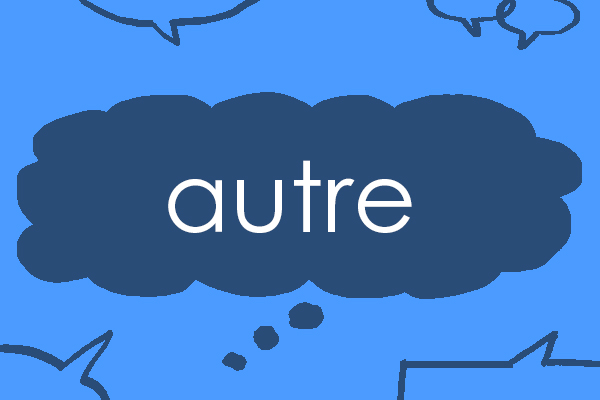Our weekly blog looks at interesting French words for learners to get to grips with. This week, our word is autre. To hear its pronunciation, check out the audio clip below:
While this word translates to English in quite a lot of different ways – which we’ll soon take a look at – its most common translation is other or another. In French, autre is both an indefinite adjective and an indefinite pronoun. If you need some extra information on what these terms mean, visit our Easy Learning French Grammar pages on adjectives and pronouns.
First of all, let’s study some examples of autre as an adjective:
un autre train another train
Ses autres dessins sont beaucoup plus colorés. Her other drawings are a lot more colourful.
L’autre jour, on s’est vus dans le bus. We saw each other on the bus the other day. (as in, in the past)
Voulez-vous essayer les autres vestes ? Would you like to try on the other jackets?
Nous ne pouvons pas voir une autre solution. We cannot see another solution.
J’ai toujours faim – je voudrais une autre pomme. I’m still hungry – I’d like another apple.
You might have noticed that the word sometimes ends with an s for adjectival agreement with plurals. But it does not have a different ending or spelling for feminine adjectival agreement. When it comes to masculine and feminine inflections, its forms will either be autre or autres, which are pronounced the same.
Now let’s look at autre as an indefinite pronoun:
l’autre the other one
les autres the other ones
d’autres others
Si vous n’aimez pas ce vin, dégustez les autres. If you don’t like this wine, taste the other ones.
Les autres ne viennent plus au restaurant. The others aren’t coming to the restaurant anymore.
Je crois que Jordi va amener d’autres. I think that Jordi is going to bring some others along.
If you’re feeling a little overwhelmed about understanding the grammar around using autre – don’t worry! This word appears in many useful, everyday expressions, so it’s just as valuable at this stage to simply know the most common phrases where autre appears:
autre chose something else; another thing
autre part somewhere else
d’autre part furthermore; on the other hand
autre que other than
quelqu’un d’autre someone else
l’un… l’autre… one… the other…
ni l’un ni l’autre neither one nor the other
Quoi d’autre ? Anything else?
You’ll even see it making an appearance within other words. Keep your eyes peeled for these adverbs:
autrefois in the past; back then
autrement dit in other words
Well done on getting yet another word into your French vocabulary this week. We hope that you’ll be back next time for some more vocab discussion!
Written by Holly Tarbet, freelance copywriter and editor.
All opinions expressed on this blog are those of the individual writers, and do not necessarily reflect the opinions or policies of Collins, or its parent company, HarperCollins.




collins_dictionary_official
The home of living language. #wotd #wordlovers #collinsdictionary
Read our word of the week definitions and blog posts: